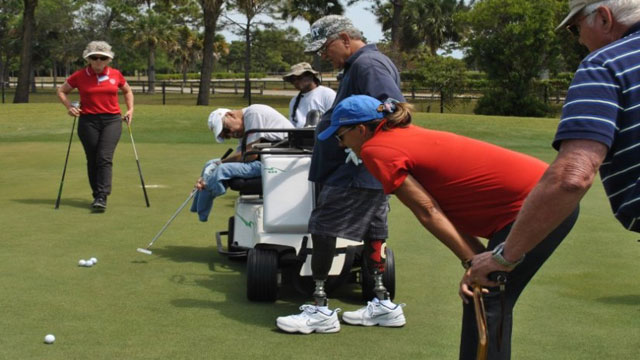NEWS
First class of military veterans graduates from PGA HOPE program
By Tracey McManus
Published on

Two months ago, Stanley Martin had barely ever held a golf club before, let alone played 18 holes.
Vertigo from a fall on a concrete floor while serving in Iraq kept the Army veteran from most physical activity, and depression kept him from socializing much with others.
But after an eight-week PGA HOPE course, run through the charitable foundation PGA REACH, Martin has established a swing, learned the fundamentals of the game and built lasting friendships with his classmates.
"Here I was able to learn about golf with veterans who have been through what I've been through," said Martin, 47, who was diagnosed with traumatic brain injury after his fall in 2003. "It helps you relax, you get to focus on yourself. It's been good."
On Thursday, 17 local veterans receiving treatment at the Charlie Norwood VA Medical Center graduated from the first PGA HOPE program offered in Georgia.
The veterans took lessons from golf professionals at Jones Creek Golf Club, which played host to the program, for three hours once a week for eight weeks and concluded the course with a celebratory lunch and awards ceremony.
PGA HOPE Coordinator John McAfee said there are now 41 programs in 22 states, but the goal is to expand it to all 50 states by 2016.
He said the program encourages veterans to continue playing golf after the course, which can support their rehabilitation efforts and assimilation back into civilian life.
"Golf is a game built around integrity, and that integrity so perfectly identifies with our military and military values," McAfee said.
He said the program works with VA hospitals to recruit veterans, and most participants are dealing with physical and emotional trauma.
He said PGA HOPE can enhance a veteran's treatment because golf is a way to increase physical activity and socialize and can be a therapeutic outlet.
"With my injury, I got to be an introspective person," said McAfee, a Purple Heart recipient who was diagnosed with PTSD and traumatic brain injury. "Golf really helps you to do that because everything has to be in a perfect position to hit a shot. And it's a social game. If you sign up for a tee time alone, they are going to pair you up with a group."
Four golf professionals at Jones Creek received training from the Adaptive Golf Academy on how to work with injured veterans before joining the program.
Doug Cameron, one of the golf professionals, said he developed a new appreciation for service members and what they deal with acclimating back to civilian life.
Over the 30 years he has been teaching golf, Cameron said, he used to instinctively reach for a student's hand to guide them in their swing. But through his training, he learned some veterans with PTSD are not comfortable with sudden movements or being touched unexpectedly.
"I told one student to keep his balance after his swing and stay steady on his feet," Cameron said. "He turned to me and said, 'I can't, you don't know how much shrapnel I have stuck in me.' That really opened my eyes."
Army veteran Secundino Rosario said the golf program has given him the confidence to get back outdoors and interact with others, something he struggled with after surviving a rocket explosion in Afghanistan in 2008.
After medically retiring last year, Rosario said, migraines, memory loss and PTSD kept him inside the house almost 24/7. But when he joined PGA HOPE in June, it opened doors he thought were closed for good.
"Golf is like therapy," he said. "I socialized for the first time in a while. We military speak the same language. We don't judge each other. Sometimes we can be scared to talk with (civilians) because people judge you. Not here."
This article was written by Tracey McManus from The Augusta Chronicle, Ga. and was legally licensed through the NewsCred publisher network.
